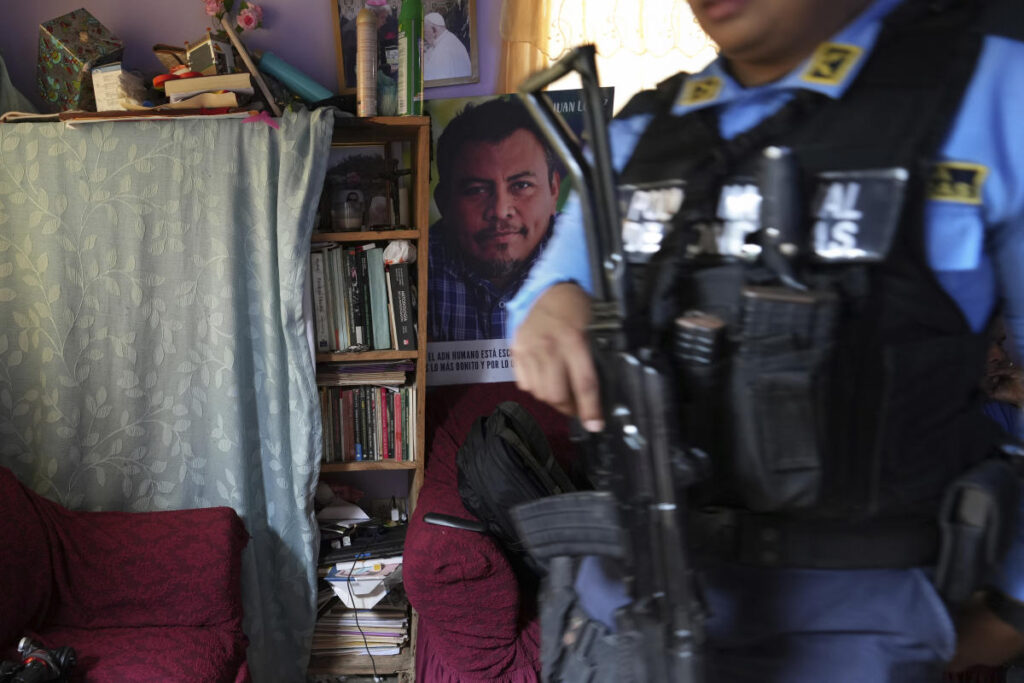In Tocoa, Honduras, the tragic killing of environmental activist Juan López has once again highlighted the dangers faced by those who defend natural resources in a country plagued by corruption and violence. López was shot six times in the chest and once in the head by a masked gunman outside a church on a sunny September afternoon, marking his death as another instance of targeted violence against environmental advocates in the region. His efforts to protect the dense jungles and pristine waters from the encroachment of an iron oxide mining project that has deep ties to government officials and drug trafficking networks positioned him as a significant figure in the fight for environmental justice. His brutal murder sparked international outcry and calls for accountability, echoing the global response to the assassination of fellow activist Berta Cáceres in 2016. Despite the dangers, López’s friends and colleagues have vowed to continue his work, expressing that his murder has only galvanized their resolve to demand justice.
Environmental activism is a treacherous undertaking in Honduras, which has earned a reputation as one of the deadliest countries for environmentalists, according to Global Witness. Last year, the organization documented at least 18 murders of individuals who fought for environmental and land rights. López’s fierce opposition to the mining project—a venture that he argued has led to significant environmental degradation and pollution of local waterways—placed him in direct conflict with powerful interests backed by the government. Activists argue that López was the target of violence stemming from corrupt relationships among mining companies, local political leaders, and drug trafficking organizations. The impacts of mining have not just violated environmental laws but have also imposed a heavy toll on the communities, resulting in threats against activists and forcing many to flee their homes in search of safety.
The void left by López’s killing weighs heavily on his family, as his wife, Thelma Peña, recounts the constant fear they lived with due to ongoing threats. Since his death, their home has been under the protection of state-assigned bodyguards, highlighting the endemic dangers faced by families of slain activists in Honduras. The family’s grief is palpable, as they navigate a new reality filled with both sorrow and uncertainty about their future after López’s tragic and untimely death. Community members have rallied in support of López’s legacy, displaying posters demanding justice in the streets of Tocoa, yet the emotional toll of his loss resonates deeply within his household and among his friends who mourn not only the loss of a leader but a family man who wrote love poems amidst the fear.
President Xiomara Castro condemned López’s murder as a “vile crime” and asserted her government’s commitment to investigate. Following López’s assassination, three individuals were detained, but the mastermind behind the killing remains at large. Despite initial optimism surrounding Castro’s presidency and her promises to address violence and corruption, local activists express skepticism about the government’s ability or willingness to enforce meaningful change. López’s coalition had previously celebrated when the government suspended mining activities in protected areas, but voices in Tocoa now echo sentiments of betrayal as they hear continuing dynamite explosions and observe mining activities persisting in defiance of the law. The disconnect between government promises and on-the-ground realities fuels frustration among many residents who have witnessed the encroachment on their land with little recourse or protection.
The intricate web of corruption surrounding the mining operations reveals deeper systemic issues within the local political landscape. López vocally criticized the Tocoa Mayor, Adán Fúnez, an ally of President Castro and a key player in the region’s politics. Accusations against Fúnez include collusion with drug trafficking organizations and the provision of false environmental permits to facilitate mining. The timing of López’s murder shortly after he publicly condemned Fúnez has raised eyebrows, with many questioning the mayor’s potential involvement. While Fúnez has maintained his innocence, the government’s investigations have yet to yield transparency or accountability, leaving activists in Tocoa wary of confronting corruption alone. Structural problems within the government impede progress, as officials point to deeper societal issues that persist despite the recognition of violence against activists.
Despite the overwhelming challenges, the spirit of activism in Tocoa remains alive as López’s friends and colleagues strive to continue his mission. However, many now wrestle with fear, recognizing the potential risks associated with their advocacy. Dalila Santiago, a close friend of López, shared their mutual promise to continue their work regardless of the dangers; she planted yuca at his grave to honor their commitment to resilience and perseverance in fighting for the environment. López left behind a legacy of hope, urging his colleagues not to despair in the face of violence. His courageous actions and unwavering dedication serve as a source of inspiration for those left behind, even as they navigate the pain of his absence, vowing to strive for justice in his honor. The resilience of these activists in the wake of tragedy speaks volumes about their commitment to protecting their land and perhaps, in a broader sense, embodies the struggle of many who stand against seemingly insurmountable odds.

